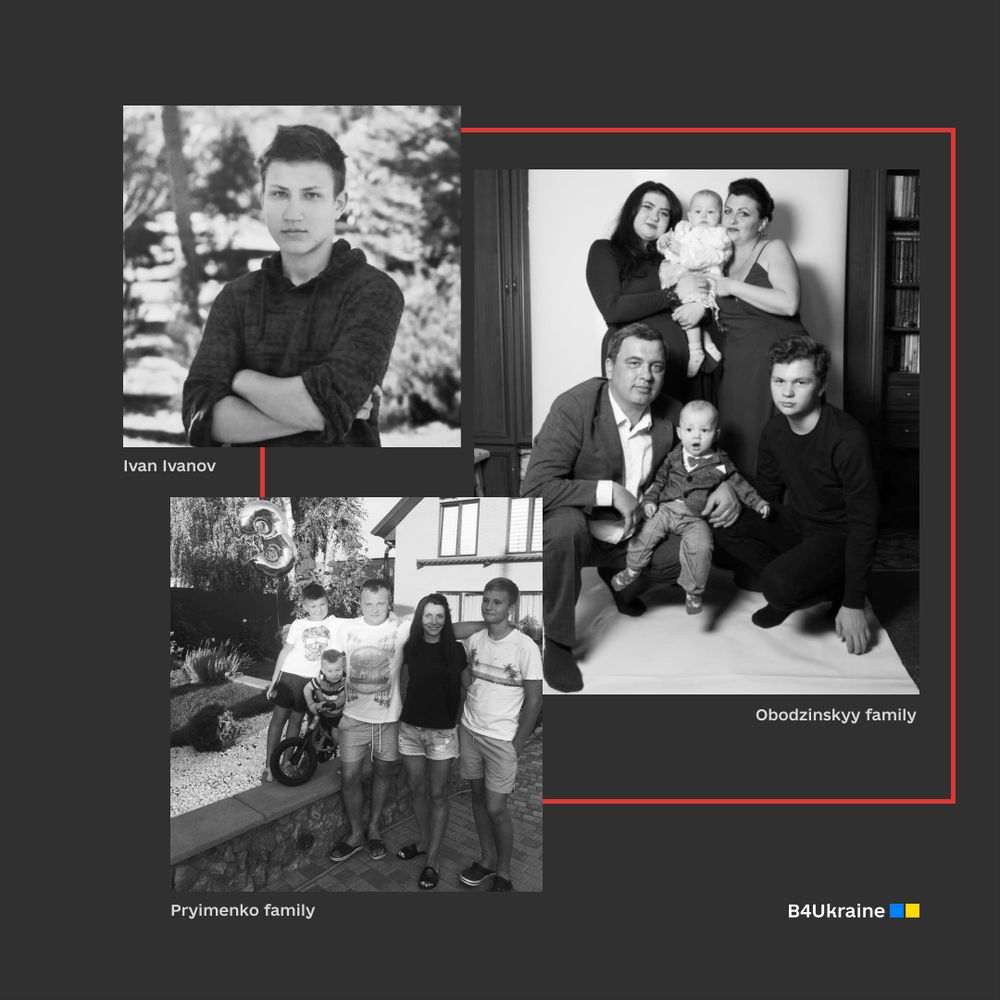
Ukrainians affected by profound personal loss appeal to western companies like Mondelez International that refuse to cut business ties with the aggressor state and continue to pay taxes to the Kremlin, thus helping fund Russia’s unprovoked war of aggression.
Artem, Yehor and Kyrylo Pryimenko — three brothers aged five to 15 — were killed together with their mother, father and grandmother when the Russians dropped an air bomb on their home in the city of Sumy.
15-year-old Ivan Ivanov was killed by the Russians when the car used by his mother and younger sister to escape the occupied village near Kyiv was brutally attacked.
Three generations of the Obodzinskyy family — 40-year-old Nataliia, her 14-year-old son Volodymyr, 19-year-old daughter Ivanna, and one-year-old grandchildren Nicole and Denys — were killed when the Russians dropped an air bomb on their home in Zhytomyr.
Increasing reports of potential war crimes and other atrocities — like the stories above — that have been committed by the Russian troops since the first days of the war have shocked the world.
As part of an unprecedented response to Russia’s unprovoked aggression, a number of international companies took significant measures to pull out of the Russian market voluntarily, demonstrating public support for Ukraine.
Yet the majority of multinationals, public and private, large and small companies, have continued to operate in Russia, a country that commits such atrocities and indirectly fills its war coffers with corporate taxes.
One of more than 1,600 such companies is the American food giant Mondelez International — the maker of the iconic Oreo biscuits, Ritz crackers, Philadelphia cream cheese and other well-known signature products.
Mondelez runs three factories in Russia, employing over 3,000 people. In 2021, the company’s annual revenue in Russia hit $1.3bn, with Mondelez alleged to have paid about $170m in taxes to the Russian state in 2020, according to the KSE Institute. With that amount of money, the Kremlin could have obtained 26 Kalibr cruise missiles that have been used to terrorize and kill Ukrainian civilians. Mondelez is complicit in indirectly financing Russian aggression.
As a major employer in Russia, Mondelez is also obliged, under Russian law, to help conscript its staff and provide resources to the Russian military, if required.
The B4Ukraine coalition has repeatedly appealed to the company’s management. Unfortunately, the company’s stance remains unchanged: CEO Dirk Van de Put continues to claim the firm doesn’t feel it’s supporting the war and justifies Mondelez’s continued business operations under the premise of providing “essential” food to the Russian population.
The term “essential” is generally understood as food required to sustain one’s life; chewing gum, cookies or chocolates do not fulfill that criteria. When contacted by B4Ukraine in November last year, Mondelez replied: “We have received feedback from a range of stakeholders and will review your input carefully.” They have not responded to our latest outreach and questions.
Ironically, in March 2022, Mondelez’ two Ukrainian manufacturing facilities in Trostyanets and Vyshhorod were “significantly damaged” by the Russian invaders. Media reported that Russian troops looted and destroyed a Mondelez chocolate factory in Trostyanets in the North of Ukraine. “They ate our snacks and took them to military posts. At the end we looked out the window — our factory was on fire,” said a local resident.
The Kremlin war machine responsible for more than 75,000 war crimes is reliant on multiple sources of financing, including corporate taxes. Most recently, the International Criminal Court (ICC) in The Hague has indicted Vladimir Putin and issued an arrest warrant for the “unlawful deportation of Ukrainian children,” which constitutes a war crime.
B4Ukraine coalition asked ordinary Ukrainians who have suffered in this unprovoked war why foreign businesses should exit Russia.
Here’s what they said:
Yulia, 24, Lviv. Yulia lost her husband.
“I learned about his death from social media. Their two-year-old daughter calls for her dad every day and does not understand why he’s no longer around. By staying in the Russian market, you support the Russian state that turns our children into orphans. Your continued presence in Russia takes away the most valuable thing from our people: their lives, and not only the lives of military personnel but also of our civilians because they hit residential buildings with rockets.”
Lyubov, 44, Kharkiv. Lyubov lost her husband, the father of her children, who was demining the territories of villages and towns mined by the Russian soldiers. His work saved dozens of lives.
“You are able to do the most important thing — not to sponsor this war, not to give money to a country that behaves like a terrorist state in the 21st century. It lives by the laws of the jungle, and drags the whole world into the swamp. DO NOT GIVE MONEY TO RUSSIA. DO NOT BECOME like THEM.”
Yulia, 41, Izyum. Yulia lost her mother and son-in-law. They died while hiding in the basement of the house when an aerial bomb hit it.
“By continuing to work in Russia you become complicit in its crimes!”
Olga, 24, Kyiv. Olga lost her fiance.
“Unfortunately, Russians do not know how to think critically, they lack empathy. Hence, they chose war. And only a healthy society can make a choice not to sponsor war. No amount of money or business is worth a person’s life. If you had a choice to give everything you have so that a person would be alive, would you still choose money? You are now faced with that choice in history – what will you choose?”
As people around the world get ready to enjoy Easter treats, Ukrainians are forced to shelter from Russian missiles. And while companies like Mondelez are counting profits made in Russia, Ukrainians are counting and mourning lost lives. The time to put human lives over profit is long overdue.
The above stories of loss were collected by the Memorial Project.